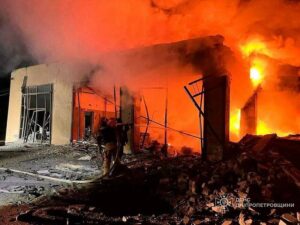
A critical battle for the city of Pokrovsk has intensified as Ukrainian and Russian forces engage in close-quarters combat. This confrontation is pivotal not only for military control but also for the broader geopolitical dynamics between the two nations. Reports indicate that both sides are vying for dominance within the same residential buildings, highlighting the intensity of the ongoing struggle.
Russian military officials claim they have effectively surrounded Pokrovsk and disrupted Ukrainian logistical operations. In contrast, Ukrainian forces reject these assertions, insisting that the fight continues and that they are inflicting substantial losses on Russian troops. The conflict in Pokrovsk is emblematic of the wider contest for influence in the Donetsk region.
Current Military Situation in Pokrovsk
In recent weeks, Russian forces have made significant inroads into Pokrovsk, exploiting vulnerabilities in Ukrainian defenses. According to the Institute for the Study of War, Russian troops have advanced approximately 39 kilometres in their ongoing campaign. Ukrainian commanders acknowledge a grim outlook, with Serhii Filimonov, commander of Ukraine’s Wolves of Da Vinci battalion, estimating that Russian forces control over 70 percent of the city.
Ukrainian President Volodymyr Zelenskiy addressed the situation on November 5, stating that Russian forces have commenced assaults aimed at capturing Pokrovsk as swiftly as possible. He noted, “The enemy began assault operations on the 5th and has continued conducting assaults… They have lost equipment, but the enemy’s number-one goal is to occupy Pokrovsk.” This admission underscores the urgency of the situation for Ukrainian forces.
Conflict experts suggest that if Pokrovsk falls, it could significantly impair Ukraine’s position in the Donbas region, potentially facilitating further Russian advances. The city is situated along what has been referred to as the “fortress belt” of Donetsk, which includes fortified locations such as Kramatorsk, Sloviansk, and Druzhkivka. The loss of Pokrovsk would not only impact military strategy but also be portrayed by Russia as a critical victory.
Geopolitical Implications
The battle for Pokrovsk unfolds against a backdrop of diplomatic maneuvers as both nations seek to gain favor with international allies, including U.S. President Donald Trump. Analysts suggest that perceptions of strength in this conflict could influence foreign support. Peter Dickinson, editor at the Atlantic Council, emphasized the stakes involved, noting that “Trump does not like losers… This will be portrayed by the Russians as a major victory.”
The humanitarian toll of the conflict remains devastating, although both sides have not disclosed comprehensive casualty figures. Estimates suggest that thousands of soldiers have been lost in the prolonged engagement. As the fighting continues, commanders on both sides prepare for an escalation of military action, anticipating that the battle for Pokrovsk will dictate the course of the region’s future.
Looking ahead, it is likely that Russian forces will continue to concentrate their troops in the parts of Pokrovsk they control, aiming to overwhelm Ukrainian defenders. In response, Ukrainian units are expected to fight tenaciously, striving to inflict as many losses as possible before the necessity for withdrawal becomes unavoidable.
The coming weeks will be crucial as the situation in Pokrovsk evolves, with implications that extend well beyond the battlefield. Each side remains resolute in their pursuit of victory, making this confrontation a focal point in the larger narrative of the ongoing conflict in Ukraine.






